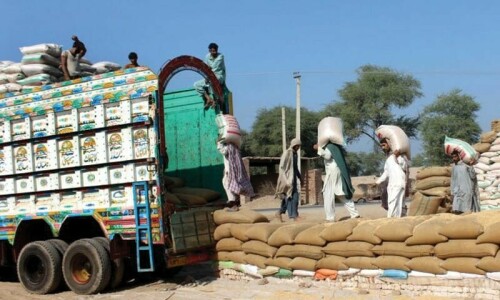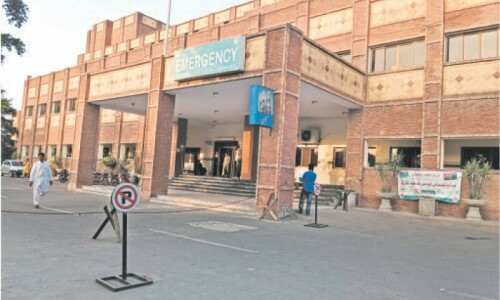LAHORE: The much-awaited census has eventually been held largely in a peaceful manner in Punjab but its outcomes may remain sketchy because of certain shortcomings.
While there are some voices saying, “We have not been counted,” a large majority asserted that the census enumerators did not ask them the questions, they were supposed to ask. How those questions’ answers have been filled in on the [census] forms are anybody’s guess.
The sixth Housing and Population Census had begun simultaneously across the country from March 15 and completed on May 24. The decennial census had been overdue since 2008 and it is pertinent to mention that Punjab had recorded a population of 73.621 million in the 1998 exercise.
The census has been held in two phases – spread over four stages owing to shortage of staff and armed forces cover. The Pakistan Bureau of Statistics (PBS) had demarcated 86,842 blocks in Punjab including 6,746 in Lahore alone.
The bureau plans to present census data results before June 30.
While the contentions have started surfacing over the competence and commitment of enumerators, social scientists believe that such an activity without involving the use of technology will ultimately fail the objectives and consequent decisions on the basis of ‘informed’ data.
Nadeem Ahmed, a resident of Gulshan-i-Ravi, Lahore, said he was consciously looking for the teams but nobody turned up during March 18 to March 28 – the first stage of population census. He said he was told that the teams would visit during the second stage (April 3 to 13) of the first phase in 16 districts but nobody turned yet again.
While Ahmed pursued the PBS officials a bit later, he was told that an advertisement was given in newspapers asking those left out to approach the bureau.
“Those, who did not get themselves registered during the [specified] period, cannot be counted anymore,” said Joint Census Commissioner, Punjab, Akbar Ali Dogar.
Another ‘flaw’ reported during census enumeration was that the enumerators did not ask most of the questions that needed to be filled in the proforma.
Many citizens, whom Dawn approached in and outside Lahore, explained that the enumerators had sought only ‘sketchy’ information that mostly comprised number of family members, gender, age, relationships etc. An overwhelming majority of citizens said the enumerators did not ask them about their mother tongue, besides other questions relating to qualification, residence, including owners, year of construction, material used for construction, number of rooms, washrooms, fuel, availability of potable water and means of communication and media.
However, Joint Census Commissioner Akbar Ali Dogar didn’t agree with the contentions and said some things were understood like names clearly explained gender and look of the house showed material used for construction.
He asserted that all enumerators were instructed to particularly ask and accurately write the mother tongue of residents in each house.
Mr Dogar said the objective was not merely finding out the total population that can more or less be calculated through projected figures but “characteristics of the population” – education, standard of living, nationality etc.
About ‘missed out’ population, he said, the bureau had advertised in newspapers and given phone numbers to contact and get themselves registered within the [stipulated] time. After the close of books, it was not possible to register latecomers, he said.
While the PBS officials have their [official] point of view, the enumerators have their own stories and ‘ordeal’ to tell.
Several enumerators from the school education department said they were called for training and duty when they were supposed to perform examination duties besides holding internal examinations in respective schools.
“Many teachers faced problems, when they were abruptly asked to reach training centres for census training,” said an enumerator, Faisal Zaman.
In the field, Mr Zaman said the first casualty was the maps of the areas marked for enumeration.
“The maps did not match the localities as well as the number of houses in allocated blocks,” he said.
“Many new housing societies like Overseas Pakistanis Foundation, Pak-Arab Society and even Bahria Town had much higher number of houses than mentioned on their job descriptions,” said Muhammad Liaquat.
In different localities, where more enumerators needed, the manpower was arranged abruptly that lacked training and commitment.
An enumerator said the census job slowed down in Lahore when a suicide bomber had targeted a van carrying army personnel on April 5.
About enumerators’ ‘incapacity’ to fill in the proforma [properly], another enumerator told Dawn that the officials like health workers and dengue surveillance staff were assigned [enumeration] duties, who faced problems in filling in the lengthy proforma.
“It needed around an hour to fill complete proforma at one house – honestly,” said an enumerator from a technical education institute. He said the enumerators generally focused more on male, female, relations, transgender, disabled and buildings.
“Enumerators did not bother to fill many columns on the basis of questions and answers and instead filled in proforma clauses like mother tongue on their own assessing through their conversation with people,” claimed an enumerator.While claims and counter-claims are already in the air, social scientists believe that the data collected on hard copies by a large number of “untrained” manpower would eventually end up in presentation of ‘cooked-up’ data.
“Such data will soon become redundant, when different stakeholders will raise objections about its authenticity in the absence of technology support and information gathering specialists,” said social scientist Dr Zakria Zakar, dean of faculty of behavioural and social sciences at Punjab University.
He said the ongoing activity was pursuing high ambitions with lack of corresponding resources.
“Pakistan needs to move ahead towards digital information technology and empower different departments like Nadra, police and development authorities to continuously upgrade data on short-term and long-term basis,” said Dr Zakar.
Expressing his disagreement over the development of a proforma looking for large-scale information, he said it [proforma] needed to be developed on modern lines to get authentic data.
Published in Dawn, May 23rd, 2017













































